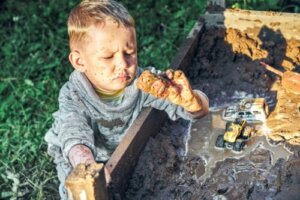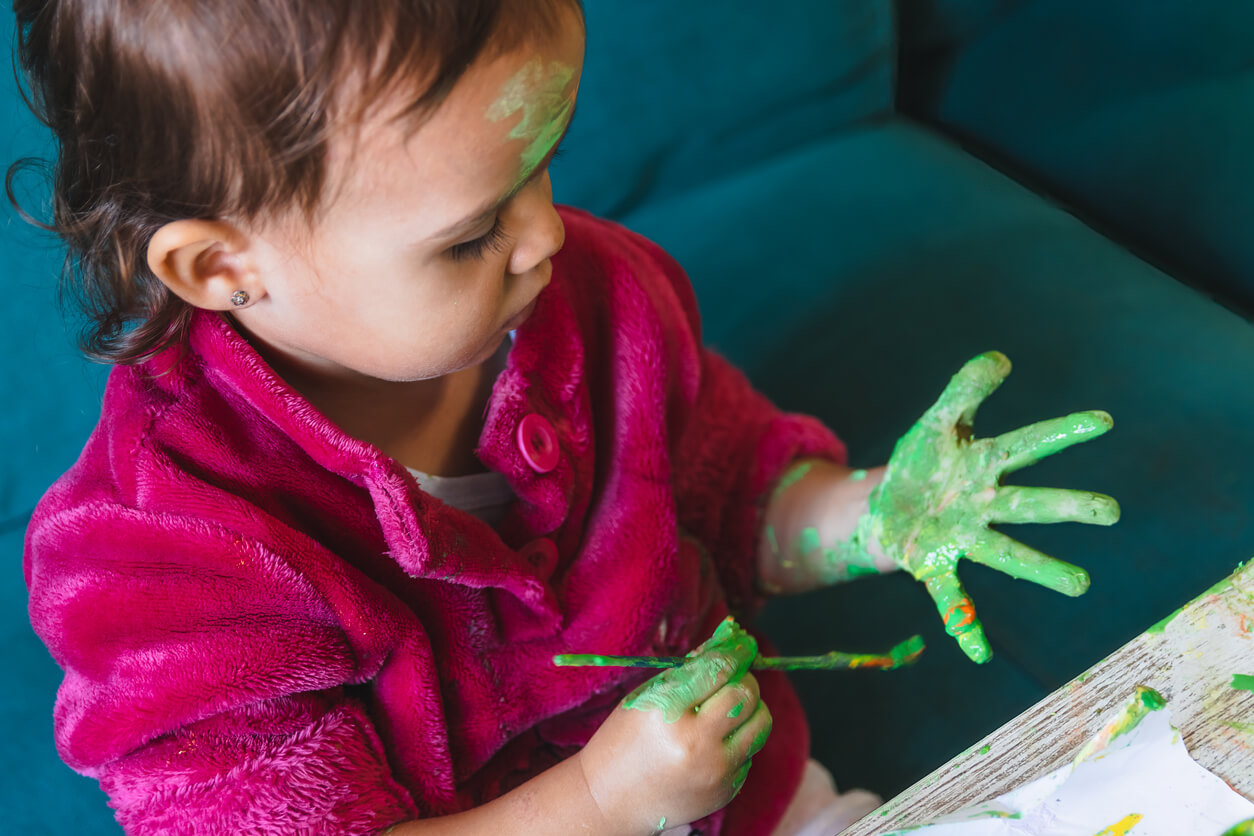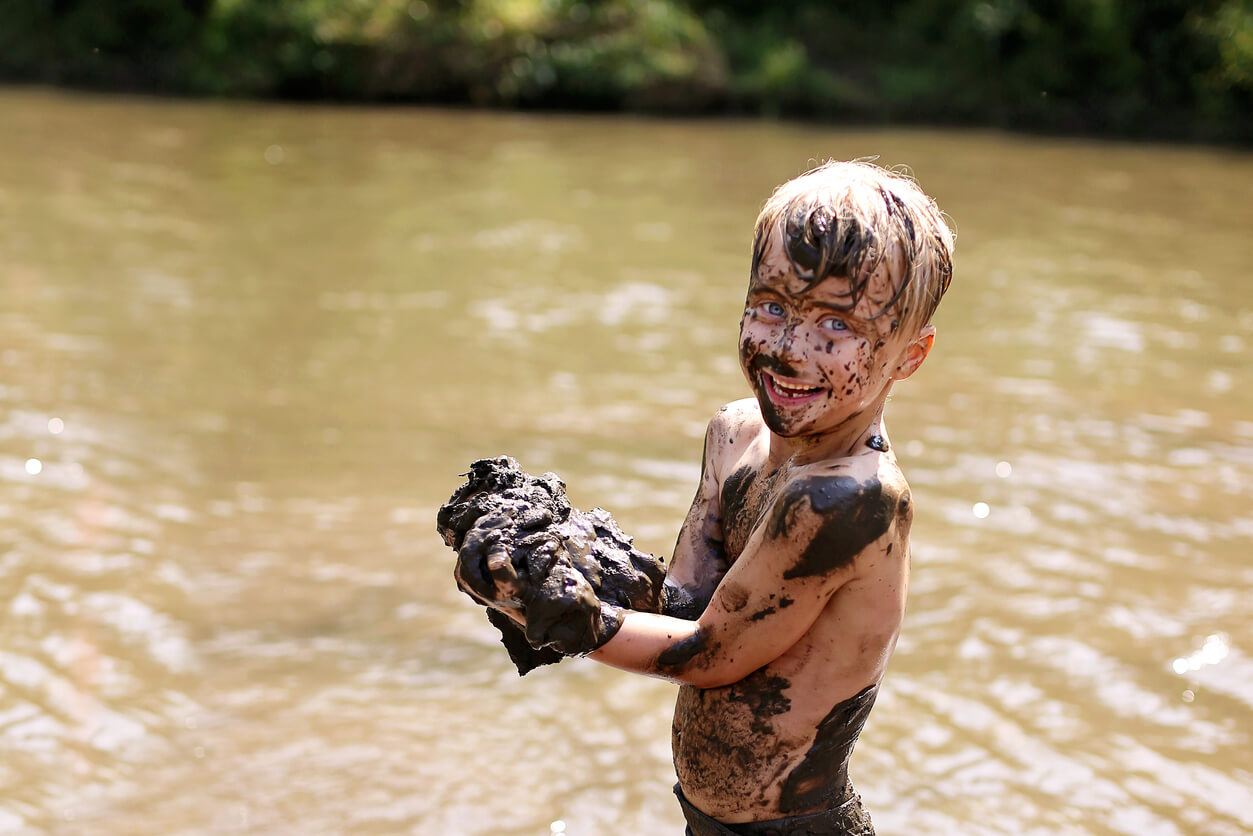5 Reasons Why You Should Allow Your Children to Get Dirty


Written and verified by the psychologist Sharon Capeluto
Most children love to get dirty while playing with mud, food, paint, water, grass, or anything else. Generally, getting dirty isn’t the goal, but the consequence of playing freely. Often, curiosity and the desire to explore causes kids to forget about cleanliness. This issue bothers many mothers who worry excessively when they notice that their children’s clothes are dirty and scold them all the time.
No one denies that hygiene is important because. In addition to guaranteeing a good smell, it protects children from coming into contact with germs and bacteria. However, getting dirty has relevant benefits that have a positive impact on their physical and emotional health. For their sake, it’s important to be more flexible on this point and allow our kids to get dirty.
Discover the reasons why you should allow your children to get dirty
Of course, it’s important to make sure that children don’t put everything in their mouths, especially when it comes to contaminated items or items they pick up from the street. Keeping them away from germs will help prevent diseases, but allowing them to get dirty is also important to promote their development. Here’s why.

1. Improves the immune system
The real world isn’t hygienic. On the contrary, we’re surrounded by dirt and impurities. When children are exposed to germs and dirt, their immune system kicks into gear and becomes stronger and stronger. This means that keeping them in a bubble and sheltering them from any bacteria can be counterproductive. This will only make their bodies unprepared to defend themselves against possible infections.
2. Produces pleasure
Children are explorers by nature. And in this process of discovery, they connect with different objects, textures, smells, and sensations. In this regard, asking them to avoid getting dirty is equivalent to asking them to stop exploring.
Any activity of daily life can become a game and can lead children to be unconcerned about stains. The focus is on enjoyment. We know that play’s a source of pleasure and a way of discovering the environment. A child who plays freely gets dirty because they’re not afraid of getting their hands in the mud or their hair full of flour. Nor do they worry about crawling on the floor or getting paint on their clothes.
3. Encourage tolerance to different textures
Many children have hypersensitivity and aversions to certain sticky, rough, or uneven textures. Generally, they show this particularity when eating, for example, a grainy puree or a scrambled egg. In addition, if they only play with smooth, soft, and regular elements, it’ll be more difficult for them to adapt to various sensations.

4. Promotes curiosity
A child who enjoys getting dirty is able to assume a curious attitude toward life. Therefore, they’re able to connect with their environment in an active and creative way. In addition, they observe, touch, and taste without fear of neglecting the neatness of their clothes or the cleanliness of their skin.
In this way, staining stimulates curiosity and fosters creativity. Allowing your children to get dirty won’t only bring them joy and fun, but will also stimulate their imagination and cognitive flexibility.
5. Encourages connection with nature
Although dirt is also present in enclosed spaces, natural environments are full of elements that can create stains, such as dirt, grass, or water. The truth is that it’s practically impossible to take a child to spend the afternoon in a park and have them come home clean. We know that outdoor activities are profoundly valuable for the healthy development of children.
The importance of finding balance
As in any aspect of life, it’s best to strive for balance and avoid falling into extremes. As we’ve seen, letting children get dirty is beneficial for them both physically and emotionally. We shouldn’t be afraid to let them get dirty from head to toe from time to time, as this is how they explore the world. For this reason, it’s better not to isolate them in impeccably clean spaces.
However, this doesn’t mean that we should forget about their hygiene, much less neglect their grooming needs. Protecting them from dangerous objects and giving them a warm bath when they finish playing will suffice.
Most children love to get dirty while playing with mud, food, paint, water, grass, or anything else. Generally, getting dirty isn’t the goal, but the consequence of playing freely. Often, curiosity and the desire to explore causes kids to forget about cleanliness. This issue bothers many mothers who worry excessively when they notice that their children’s clothes are dirty and scold them all the time.
No one denies that hygiene is important because. In addition to guaranteeing a good smell, it protects children from coming into contact with germs and bacteria. However, getting dirty has relevant benefits that have a positive impact on their physical and emotional health. For their sake, it’s important to be more flexible on this point and allow our kids to get dirty.
Discover the reasons why you should allow your children to get dirty
Of course, it’s important to make sure that children don’t put everything in their mouths, especially when it comes to contaminated items or items they pick up from the street. Keeping them away from germs will help prevent diseases, but allowing them to get dirty is also important to promote their development. Here’s why.

1. Improves the immune system
The real world isn’t hygienic. On the contrary, we’re surrounded by dirt and impurities. When children are exposed to germs and dirt, their immune system kicks into gear and becomes stronger and stronger. This means that keeping them in a bubble and sheltering them from any bacteria can be counterproductive. This will only make their bodies unprepared to defend themselves against possible infections.
2. Produces pleasure
Children are explorers by nature. And in this process of discovery, they connect with different objects, textures, smells, and sensations. In this regard, asking them to avoid getting dirty is equivalent to asking them to stop exploring.
Any activity of daily life can become a game and can lead children to be unconcerned about stains. The focus is on enjoyment. We know that play’s a source of pleasure and a way of discovering the environment. A child who plays freely gets dirty because they’re not afraid of getting their hands in the mud or their hair full of flour. Nor do they worry about crawling on the floor or getting paint on their clothes.
3. Encourage tolerance to different textures
Many children have hypersensitivity and aversions to certain sticky, rough, or uneven textures. Generally, they show this particularity when eating, for example, a grainy puree or a scrambled egg. In addition, if they only play with smooth, soft, and regular elements, it’ll be more difficult for them to adapt to various sensations.

4. Promotes curiosity
A child who enjoys getting dirty is able to assume a curious attitude toward life. Therefore, they’re able to connect with their environment in an active and creative way. In addition, they observe, touch, and taste without fear of neglecting the neatness of their clothes or the cleanliness of their skin.
In this way, staining stimulates curiosity and fosters creativity. Allowing your children to get dirty won’t only bring them joy and fun, but will also stimulate their imagination and cognitive flexibility.
5. Encourages connection with nature
Although dirt is also present in enclosed spaces, natural environments are full of elements that can create stains, such as dirt, grass, or water. The truth is that it’s practically impossible to take a child to spend the afternoon in a park and have them come home clean. We know that outdoor activities are profoundly valuable for the healthy development of children.
The importance of finding balance
As in any aspect of life, it’s best to strive for balance and avoid falling into extremes. As we’ve seen, letting children get dirty is beneficial for them both physically and emotionally. We shouldn’t be afraid to let them get dirty from head to toe from time to time, as this is how they explore the world. For this reason, it’s better not to isolate them in impeccably clean spaces.
However, this doesn’t mean that we should forget about their hygiene, much less neglect their grooming needs. Protecting them from dangerous objects and giving them a warm bath when they finish playing will suffice.
All cited sources were thoroughly reviewed by our team to ensure their quality, reliability, currency, and validity. The bibliography of this article was considered reliable and of academic or scientific accuracy.
- Aucouturier, B. (2018). Actuar, jugar, pensar. Puntos de apoyo para la práctica psicomotriz educativa y terapéutica. Barcelona: Editorial Graó.
- Delgado Linares, I. (2011). El juego infantil y su metodología. Servicios socioculturales y a la comunidad. Educación infantil. España: Ediciones Paraninfo.
This text is provided for informational purposes only and does not replace consultation with a professional. If in doubt, consult your specialist.








